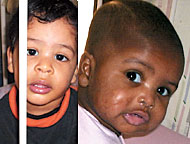JEDDAH, 17 June 2006 — Security guards at King Abdul Aziz Hospital & Tumor Center found a seven-day-old baby in a waiting room at the hospital on June 4. Next to the newborn was a bag containing bottles and baby formula. The parents of the child were nowhere to be seen.
Approximately two hours later, security personnel at the hospital received a phone call from a man. “The baby is mine,” he said, according to a staffer at the hospital interviewed by Arab News. “Please take care of her,” he added before hanging up the phone. Police traced the call to a Jeddah phone cabin.
King Abdul Aziz Hospital has a nursery devoted to abandoned children. The newborn, who has yet to be named by the hospital staff that cares for her, occupies this nursery with three other babies and a toddler, each named by strangers, each with a different story.
Mashail is a four-month-old who was born to African parents. The Red Crescent brought her in recently after finding her abandoned on a Jeddah street.
Mashail, who tested positive for HIV, will stay at the hospital until she is healthy enough to be (hopefully) adopted by a family.
No information was available on the actual number of abandoned babies in the Kingdom. “Sometimes the cradles in this room get fully occupied,” said one of the hospital nurses that care for the “babies with special circumstances,” as they are called.
Babies are sometimes brought in suffering from injuries caused by their abandonment. Last year, a baby was found in garbage bin and brought to the hospital; a dog had partially eaten one of the infant’s hands. The hospital treated the injury and the child was later transferred to a local orphanage. The women’s affairs department at the Ministry of Social Affairs works to find adoptive parents for the abandoned children.
Mojeba Majrashi, a spokesperson for the ministry’s adoption services, describes how families adopt abandoned children.
“Adoptive parents request specific ages, skin color and other requirements,” said Majrashi. “The women’s affairs department contacts us to ask if we have any abandoned babies with overlapping specifications.”
When the department finds what they are looking for, they process the needed paperwork. Custody of the children is then assigned to the adoptive parents, keeping the names assigned to them by the ministry.
Children abandoned or given up for adoption remain in hospitals until they have received their vaccinations and are deemed healthy. If they haven’t found adoptive families by then, they are transferred to a local orphanage and the search for adoptive parents continues.
The department recently found families for two of the children — Bandar, a 16-month-old boy, and Anoud, a two-month-old girl — at the hospital’s ward.
Bandar was born at King Abdul Aziz University Hospital to a 16-year-old girl who gave up the child for adoption.
“His mother admitted that he was born out of wedlock,” said Majrashi. “She did not say who his father is.”
Majrashi says the biggest challenge is children like Mashail. “The most difficult situations we face are with virus-carrier babies,” she said. “No one would want to adopt those babies so they stay at the hospital until doctors make sure their condition is stable.”
After that, the child is likely to be a ward of the state until it succumbs to AIDS or becomes an adult with an uncertain, and probably grim, future.
According to Majrashi, most abandoned babies in Jeddah are found in Al-Samir and Kilo 11 in the southeastern and southern parts of the city, home to a large population of undocumented East African migrants.


